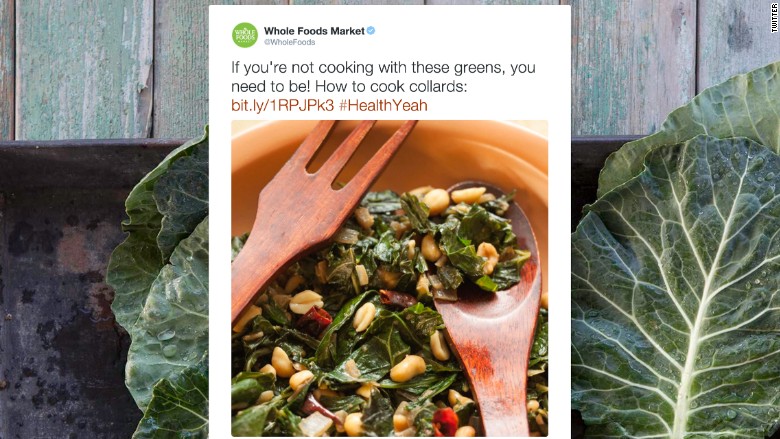Post by Admin on Jan 15, 2016 14:26:52 GMT -8
Whole Foods gets in hot water with Black Twitter

You should try collard greens. That's all Whole Foods was trying to say when it tweeted a picture of collard greens with peanuts and a link to recipes.
But Black Twitter didn't take kindly to this. Whole Food's Twitter feed was quickly flooded with lots of memes and plenty of side eye.
I was annoyed too, because like other African Americans, I'm tired of people "discovering" things that have been a part of black culture for hundreds of years.
These days everything has kale and collard greens near it, on it or in it, just like quinoa a few years ago. But collard greens, kale, mustard and turnip greens have always been staples of African American culture. Greens are actually part of West African cuisine where the slaves were captured.
Collard Greens are a powerhouse food and easy to cultivate. During slavery, African Americans needed crops that could be easily maintained during their down time since they worked thirteen hour days.
What African Americans reacted to on Thursday is the way their culture has been co-opted.
"For other people collards are a trend -- for us they are a tradition," said food writer and historian Michael Twitty. "We aren't against cultural sharing, it's the appropriation without credit that we object to."
Whole Foods (WFM) didn't respond to a request for comment.
I personally have been asked by people with a straight face, "Have you had collard greens?"
To me, that's like asking someone if they've had bread. Yes, yes I have and I know what to do with it.
Twitty also points out that collard greens prepared with peanuts is actually a traditional African American dish. He attributes the fact that Black Twitter didn't know that to "lack of awareness of other parts of our identity."
So, in this Twitter feud everyone has a point.

You should try collard greens. That's all Whole Foods was trying to say when it tweeted a picture of collard greens with peanuts and a link to recipes.
But Black Twitter didn't take kindly to this. Whole Food's Twitter feed was quickly flooded with lots of memes and plenty of side eye.
I was annoyed too, because like other African Americans, I'm tired of people "discovering" things that have been a part of black culture for hundreds of years.
These days everything has kale and collard greens near it, on it or in it, just like quinoa a few years ago. But collard greens, kale, mustard and turnip greens have always been staples of African American culture. Greens are actually part of West African cuisine where the slaves were captured.
Collard Greens are a powerhouse food and easy to cultivate. During slavery, African Americans needed crops that could be easily maintained during their down time since they worked thirteen hour days.
What African Americans reacted to on Thursday is the way their culture has been co-opted.
"For other people collards are a trend -- for us they are a tradition," said food writer and historian Michael Twitty. "We aren't against cultural sharing, it's the appropriation without credit that we object to."
Whole Foods (WFM) didn't respond to a request for comment.
I personally have been asked by people with a straight face, "Have you had collard greens?"
To me, that's like asking someone if they've had bread. Yes, yes I have and I know what to do with it.
Twitty also points out that collard greens prepared with peanuts is actually a traditional African American dish. He attributes the fact that Black Twitter didn't know that to "lack of awareness of other parts of our identity."
So, in this Twitter feud everyone has a point.
money.cnn.com/2016/01/14/news/companies/whole-foods-collard-greens-black-twitter/
At this point Black Twitter is useless







